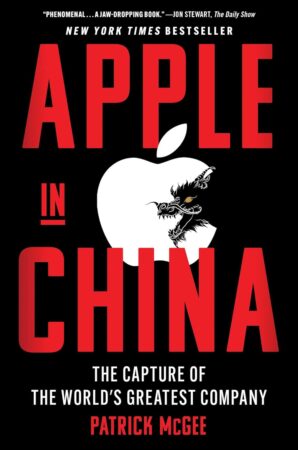Apple in China: The Capture of the World’s Greatest Company
Patrick McGee (Scribner, $43, 437 pages)
 Journalist Patrick McGee reports in his book Apple in China, about how one of the world’s largest companies, Apple, maker of the iPhone and other ubiquitous consumer gadgets, “bound its future inextricably to a ruthless authoritarian state” – that of Red China. McGee, a former Wall Street Journal reporter who now writes for the Financial Times goes beyond what is commonly known about Apple’s presence in China – the cheap manufacturing of parts, the poor working conditions in Apple’s factories, the company’s censorship of content on Apple devices that might upset Beijing’s ChiComms – and goes deeper to illustrate how intertwined the “capitalist” company and “communist” country have become. McGee argues that not only has cheap Chinese labour made Apple what it is today, but that “China wouldn’t be China today without Apple” because the company’s “investments in the country have been spectacular, rivalling nation-building efforts.” In 1996, Apple began investing in Taiwan as it sought to lower production costs; Foxconn, the Taiwanese manufacturing company Apple contracted, in turn, looked for cheaper labour and began building factories in mainland China. This provided China not only jobs, but know-how. McGee calls this relocation a massive “technology transfer on an extraordinary scale” and helped accelerate China’s technological advancement. Local and national governments subsidized the building of factories and provided labour by forcing workers to move to cities with Apple facilities. The model would be used to attract other capitalist companies to move their production to the communist country. State-run companies sprung to supply Apple facilities and the tech giant is now so embedded within China that McGee says it is nearly impossible for Apple to relocate their manufacturing. Afraid to upset the ruling communist party that provides labour and parts to make Apple products, the company is supine when Beijing makes demands on what content can be viewed on those products within its borders. Considering Apple’s reliance on China, It is worth asking whether it makes those demands for citizens of other countries, too.
Journalist Patrick McGee reports in his book Apple in China, about how one of the world’s largest companies, Apple, maker of the iPhone and other ubiquitous consumer gadgets, “bound its future inextricably to a ruthless authoritarian state” – that of Red China. McGee, a former Wall Street Journal reporter who now writes for the Financial Times goes beyond what is commonly known about Apple’s presence in China – the cheap manufacturing of parts, the poor working conditions in Apple’s factories, the company’s censorship of content on Apple devices that might upset Beijing’s ChiComms – and goes deeper to illustrate how intertwined the “capitalist” company and “communist” country have become. McGee argues that not only has cheap Chinese labour made Apple what it is today, but that “China wouldn’t be China today without Apple” because the company’s “investments in the country have been spectacular, rivalling nation-building efforts.” In 1996, Apple began investing in Taiwan as it sought to lower production costs; Foxconn, the Taiwanese manufacturing company Apple contracted, in turn, looked for cheaper labour and began building factories in mainland China. This provided China not only jobs, but know-how. McGee calls this relocation a massive “technology transfer on an extraordinary scale” and helped accelerate China’s technological advancement. Local and national governments subsidized the building of factories and provided labour by forcing workers to move to cities with Apple facilities. The model would be used to attract other capitalist companies to move their production to the communist country. State-run companies sprung to supply Apple facilities and the tech giant is now so embedded within China that McGee says it is nearly impossible for Apple to relocate their manufacturing. Afraid to upset the ruling communist party that provides labour and parts to make Apple products, the company is supine when Beijing makes demands on what content can be viewed on those products within its borders. Considering Apple’s reliance on China, It is worth asking whether it makes those demands for citizens of other countries, too.




